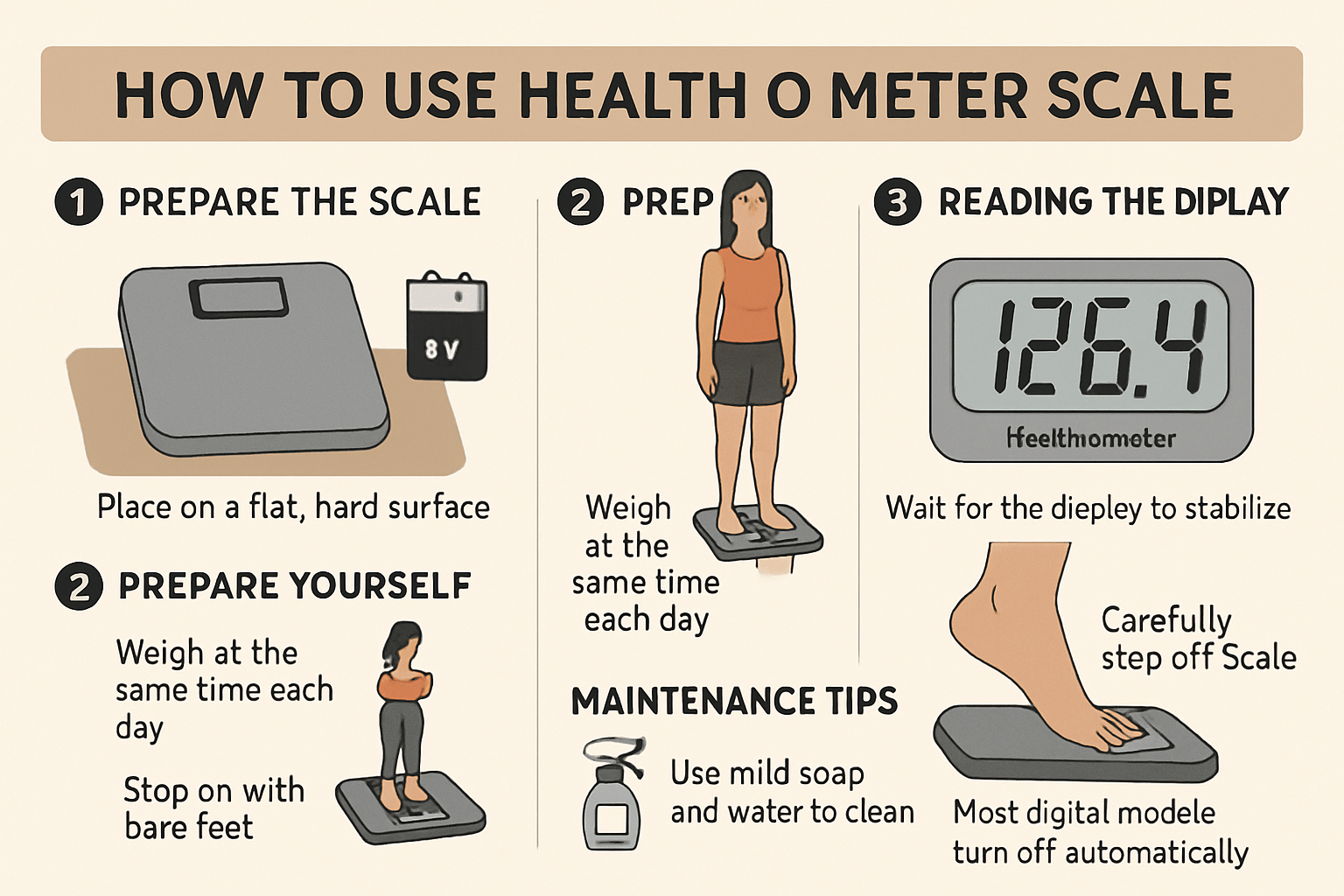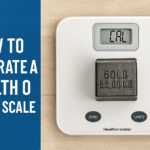Maintaining a healthy weight is one of the cornerstones of overall wellness. Whether you’re tracking your fitness goals, monitoring weight changes, or simply staying informed about your health, using a reliable scale is essential. Among the most trusted brands is Health o meter, known for producing both home-use and professional-grade scales. However, knowing how to use Health o meter scale properly is key to ensuring accurate readings every time. This guide breaks it all down in a simple and comprehensive format.
Introduction
Health o meter scales are designed to deliver reliable and consistent weight measurements. They are widely used in households, clinics, and gyms due to their versatility, precision, and durability. Despite their reliability, users often make common mistakes in their usage that can lead to incorrect readings. That’s why understanding how to use a Health o meter scale properly is more than just stepping on—it involves setup, placement, calibration, and routine maintenance.
Types of Health o Meter Scales
Before diving into usage instructions, it helps to understand what type of Health o meter scale you’re using. The brand manufactures several different models, and each may require a slightly different approach.
- Digital Scales: These are battery-powered and display your weight in digital numbers. They often come with features like memory tracking, BMI calculation, and body fat analysis.
- Mechanical Dial Scales: These classic models use a needle and dial system, requiring manual calibration.
- Medical or Professional Scales: Often used in clinics, these include height rods and are designed for heavy-duty usage.
- Body Composition Scales: In addition to weight, these measure body fat, hydration, and muscle mass.
- Bluetooth Smart Scales: These connect to mobile apps and store data over time.
Each type is built for different use cases, but the core principles for using them remain quite similar.
Getting Started
When you first unbox your Health o meter scale, take time to familiarize yourself with its parts. Most digital scales will include the main weighing platform, a battery compartment (usually at the bottom), and a display panel. For mechanical models, there is typically a dial and a knob for calibration.
If you are using a digital model, check the battery compartment and insert or replace batteries as needed. Most scales operate on standard AA or AAA batteries. Once batteries are installed, set the unit to your preferred weight measurement (pounds or kilograms), if that option is available.
Placement of the Scale
One of the most overlooked aspects of using a Health o meter scale is where you place it. Placement can significantly affect accuracy.
Best Placement Practices:
- Use a hard, flat surface like tile, wood, or linoleum.
- Avoid placing the scale on carpets, rugs, or uneven surfaces.
- Ensure the area is free of dust or debris under the scale.
Placing the scale in a consistent spot, such as your bathroom floor, helps ensure consistent readings.
Step-by-Step Guide to Using the Scale
Learning how to use a Health o meter scale correctly involves more than just stepping on and reading the number. Here’s a structured approach to get the most accurate and reliable results:
Step-by-Step Instructions:
- Power On the Scale
If it’s a digital model, press the “ON” button or tap the surface lightly with your foot. Wait for the display to show “0.0”. - Calibration or Zeroing
Make sure the scale reads zero before stepping on. Mechanical models may need manual adjustment using a dial. - Step on Properly
Stand still, with both feet centered on the platform. Keep your arms relaxed by your sides and look straight ahead. Don’t lean or shift your weight. - Wait for the Reading
Allow a few seconds for the number to stabilize. Digital models may beep when ready. - Step Off Carefully
After reading your weight, step off slowly. Some digital models will turn off automatically; others may require manual shutdown.
How to Calibrate or Zero the Scale
Calibration is crucial, especially if your scale has been moved or shows inconsistent readings. Here’s how to do it:
| Model Type | How to Calibrate |
|---|---|
| Digital Scale | Tap the scale and wait for “0.0” to display. Some models have a “Cal” or “Zero” button. |
| Mechanical Dial | Use the adjustment knob near the dial to set the needle to zero. |
| Medical Scale | Check for balance at the beam. Adjust weights to zero before use. |
Calibration should be done regularly, especially after moving the scale or replacing the batteries.
Tips for Getting the Most Accurate Results
To make sure your weight tracking is consistent and reliable, follow these tips:
- Weigh yourself at the same time every day, ideally in the morning before eating or drinking.
- Wear minimal clothing or none at all.
- Avoid weighing yourself right after exercise or meals.
- Empty your pockets and remove shoes.
- Use the same scale every time.
These small steps can make a big difference in the accuracy of your readings.
Using Additional Features (If Applicable)
Some Health o meter scales come with advanced features like body composition analysis, Bluetooth syncing, and multi-user profiles.
Common Features Include:
- Body Fat Measurement
- Hydration Level Tracking
- BMI Calculation
- Memory Storage for Multiple Users
- Bluetooth Sync with Mobile Apps
To use these features, consult your specific model’s user manual, and follow the setup instructions for profile creation and app pairing.
Troubleshooting Common Issues
Even the best scales can have occasional problems. Here are some common issues and how to fix them:
| Issue | Solution |
|---|---|
| Scale won’t turn on | Check and replace batteries. Try pressing the reset button. |
| Reading seems inaccurate | Recalibrate the scale. Ensure it’s on a flat surface. |
| Display shows “Err” | You may be exceeding the weight limit or the surface is unstable. |
| Weight fluctuates too much | Ensure consistent usage conditions. Avoid multiple weigh-ins per day. |
Maintenance and Care
To extend the lifespan of your scale and maintain accuracy, take good care of it.
- Clean the surface with a damp cloth—avoid harsh chemicals or submerging in water.
- Store it in a dry, temperature-controlled area.
- Replace batteries every 6–12 months, even if not used frequently.
Proper care also ensures hygiene, especially if used by multiple people.
Health and Fitness Use Cases
Understanding how to use a Health o meter scale allows you to incorporate it into various health routines. Whether you are trying to lose weight, gain muscle, or simply monitor your progress, consistency is key. Use the scale along with food logs, fitness apps, or wearable trackers to create a holistic picture of your health.
When to Replace or Upgrade Your Scale
If your scale is more than 5 years old, struggles with calibration, or displays inconsistent readings, it might be time for an upgrade.
| Sign It’s Time to Upgrade | Why It Matters |
|---|---|
| Inconsistent readings | May reflect internal malfunction |
| Damaged platform or display | Safety risk or difficulty in reading measurements |
| No modern features | Newer models provide better tracking tools |
Modern scales offer Bluetooth syncing, fitness app integration, and better sensitivity.
Frequently Asked Questions (FAQs)
Q: How often should I weigh myself?
A: Daily or weekly, depending on your goals. Weighing yourself at the same time each day improves consistency.
Q: Why does my scale give different readings?
A: Variations can result from inconsistent placement, movement during weighing, or battery issues.
Q: Can I use the scale with socks on?
A: For body fat analysis, barefoot use is required. For basic weight, socks won’t affect readings much.
Q: Are Health o meter scales medically accurate?
A: Many models, especially the professional-grade ones, are designed to meet clinical standards.
Conclusion
Knowing how to use Health o meter scale the right way is essential for getting precise and consistent weight measurements. Whether you’re using it for medical purposes, fitness goals, or general health awareness, following correct procedures—from placement to calibration—makes all the difference. With regular maintenance and mindful usage, your Health o meter scale can be a trusted health companion for years to come.
Other Articles
Understanding the 3822 Blossom Terrace Erie PA Water Hook Up Diagram: A Complete Homeowner’s Guide
How Do Game Conservation Laws Affect Hunters? | Complete Guide for Ethical Hunting
How to Scale a Crypto Exchange Business: The Complete Growth Blueprint
Can I Trade In a Financed Car? Complete Guide to Trading in a Car with a Loan








